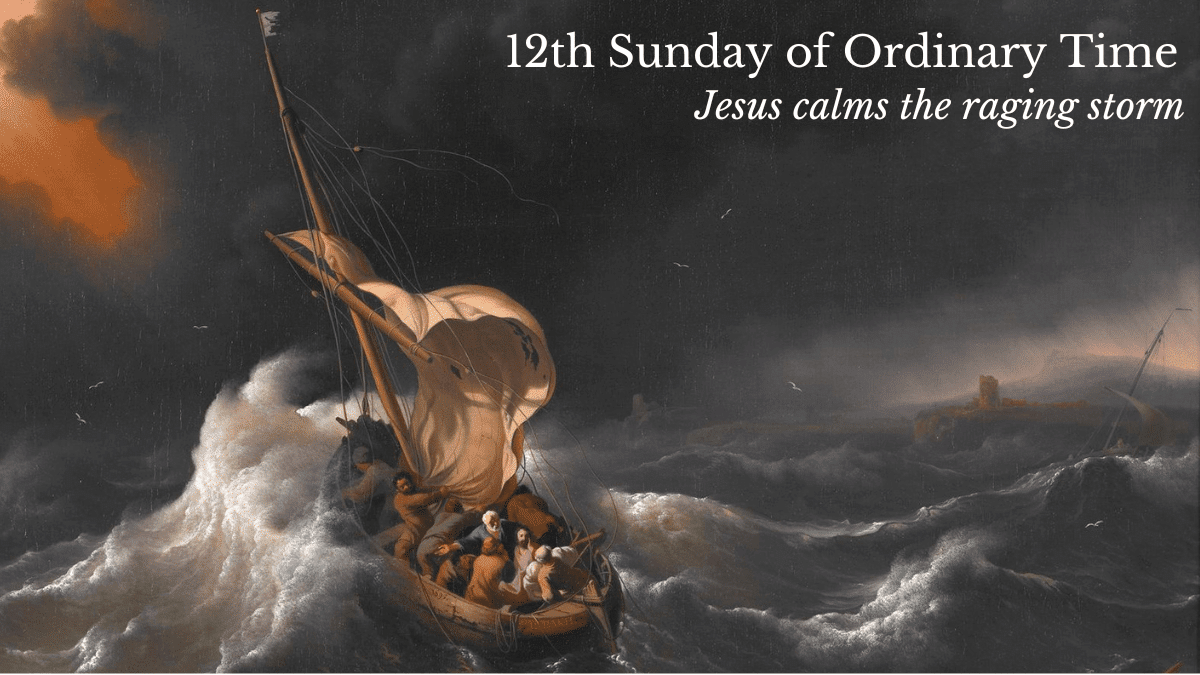On the Back Porch
Reading, pondering and studying God’s Word is sometimes best done “on the back porch.” Each week we will try to offer something for you and your “back porch time.”

12th Sunday, Year B

What We Celebrate
Last Sunday, the gospel readings were filled with parables about the Kingdom of God. The effect of his teaching with parables was to keep those on the “outside” from understanding: “Without parables he did not speak to them.” But it was different for the disciples: “but to his own disciples he explained everything in private.” (4:34). But the disciples were still a little less than clear. But parables aren’t the only way to teach! In the gospel for the 12th Sunday, we encounter the first of several miracles that demonstrate the extraordinary character of Jesus’ power as he stills a raging storm on the Sea of Galilee (4:35-41). Outside our gospel reading, this miracle is followed by others: Jesus casts out a demonic legion (5:1-20); raises Jairus’ daughter and heals a woman sick for 12 years (5:21-43 – our gospel text for next week). These miracles show that Jesus has power over the realms of nature, the demonic, and death.
There is a lot going on in this gospel. Take a moment “on the back porch” and find out more about this amazing Gospel.
Full Text of the Sunday Readings
Detailed Commentary
Christ stilling the storm on the Sea of Galilee | Ludolf Bakhuizen | 1695 | Indianapolis Museum of Art | PD
A Storm at Sea – the Book of Jonah
This gospel carries an echo from the story of Jonah – not the swallowed by a great fish/whale, but what happened before. The Word of God came to Jonah and commissioned him to be a prophet to the moral enemy of the Jews – the Assyrians. Jonah’s response:
“But Jonah made ready to flee to Tarshish, away from the LORD. He went down to Joppa, found a ship going to Tarshish, paid the fare, and went down in it to go with them to Tarshish, away from the LORD. The LORD, however, hurled a great wind upon the sea, and the storm was so great that the ship was about to break up. Then the sailors were afraid and each one cried to his god. To lighten the ship for themselves, they threw its cargo into the sea. Meanwhile, Jonah had gone down into the hold of the ship, and lay there fast asleep. The captain approached him and said, ‘What are you doing asleep? Get up, call on your god! Perhaps this god will be mindful of us so that we will not perish.’” (Jonah 1:3-6)
The first 3-4 minutes will give you the context (…or watch the whole video!)
…and the story continues
In the Jonah account “each one cried to his god.” This is a religious S.O.S as each sailor prays to his god; one of those gods has sent the raging storm, right? They are “shot gunning” prayers across all the spectrum of gods. It is to their credit that even they can see that this is no ordinary storm but betrays a divine reaction to some grave sin. But alas, the tempest rages: they can’t have called on the right god yet. Left to their own efforts, they begin to jettison cargo in an attempt to save themselves.
In the parallel account in Matthew, the disciples’ words to Jesus fit the anticipated pattern, “Lord, save us! We are perishing!” (Matt. 8:25). In Mark, however, their cry carries an edge – rebuke? Disbelief? Incredulousness? It is hard to assign a meaning that leaves the disciples other than accusing Jesus of being indifferent to their plight.
In the middle of this “all hands on deck” effort, “Meanwhile, Jonah had gone down into the hold of the ship and lay there fast asleep.” The original hearers as well as modern ones have to wonder, “how in the world could he be curled up fast asleep when the tempest rages? I know some people can sleep through anything, but really?”